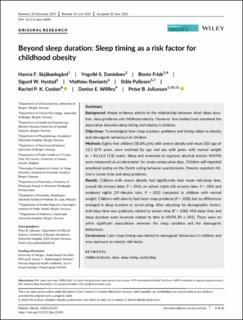Beyond sleep duration: Sleep timing as a risk factor for childhood obesity
Skjåkødegård, Hanna Flækøy; Danielsen, Yngvild Sørebø; Frisk, Bente; Hystad, Sigurd William; Roelants, Mathieu; Pallesen, Ståle; Conlon, Rachel; Wilfley, Denise E.; Juliusson, Petur Benedikt
Peer reviewed, Journal article
Published version
Permanent lenke
https://hdl.handle.net/11250/2684662Utgivelsesdato
2020Metadata
Vis full innførselSamlinger
- Import fra CRIStin [3628]
- Institutt for helse og funksjon [593]
Originalversjon
Skjåkødegård, H. F., Danielsen, Y. S., Frisk, B., Hystad, S. W., Roelants, M., Pallesen, S., … Juliusson, P. B. (2020). Beyond sleep duration: Sleep timing as a risk factor for childhood obesity. Pediatric Obesity. 10.1111/ijpo.12698Sammendrag
Background
Ample evidence attests to the relationship between short sleep duration, sleep problems and childhood obesity. However, few studies have examined the association between sleep timing and obesity in children.
Objectives
To investigate how sleep duration, problems and timing relate to obesity and obesogenic behaviours in children.
Methods
Eighty‐five children (58.8% girls) with severe obesity and mean (SD) age of 12.1 (2.9) years, were matched by age and sex with peers with normal weight (n = 85,12.0 [2.8] years). Sleep and moderate‐to‐vigorous physical activity (MVPA) were measured via accelerometer for seven consecutive days. Children self‐reported emotional eating on the Dutch eating behavior questionnaire. Parents reported children's screen time and sleep problems.
Results
Children with severe obesity had significantly later mean mid‐sleep time, overall (36 minutes later, P < .001), on school nights (36 minutes later, P < .001) and weekend nights (39 minutes later, P = .002) compared to children with normal weight. Children with obesity had more sleep problems (P = .030), but no differences emerged in sleep duration or social jetlag. After adjusting for demographic factors, mid‐sleep time was positively related to screen time (P = .030). Mid‐sleep time and sleep duration were inversely related to time in MVPA (Ps ≤ .041). There were no other significant associations between the sleep variables and the obesogenic behaviours.
Conclusions
Later sleep timing was related to obesogenic behaviours in children and may represent an obesity risk factor.

